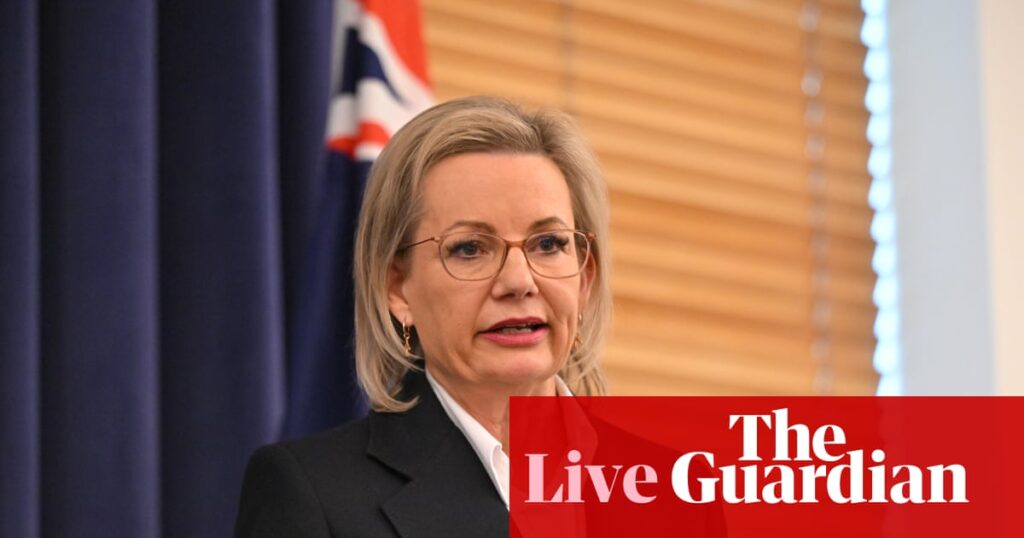Ley criticises leak of Treasury advice before productivity roundtable
The opposition leader, Sussan Ley, sharply criticised the Labor government after the ABC received a leaked document from Treasury that includes a number of recommended outcomes for the productivity roundtable, which isn’t scheduled to take place until next week.
The ABC published details of the pre-written list of ideas that could come from the roundtable, including a freeze on the National Construction Code and measures to speed up housing approvals. A spokesperson for the treasurer said the list’s preparation was standard procedure, and the government was not “pre-empting ideas” but “preparing for them as you would expect”.
Ley, however, claimed the leaks demonstrated the productivity roundtable was just an exercise that is “being choreographed”. She told Channel 9’s Today this morning:
It’s all been lined up. Statements are ready to go out. People are going there in good faith, and they want to see outcomes. They want to see us growing the economic pie, and they want to see Australians pay less tax and be rewarded for their effort. And I fear that none of those things are actually on the agenda at this productivity roundtable.
Meanwhile, there’s a growing list of broken promises. Your energy bills would come down. In fact, they’re going up … But tax is really the main thing on this productivity roundtable.
Key events
Westpac’s quarterly profit hits $1.9bn, up 14% over first half of the year
Westpac’s third-quarter net profit hit $1.9bn for the three months to 30 June, a 14% climb over the first half of 2025.
The bank said it is piloting new AI technology to enhance “real-time scam detection”.
Anthony Miller, Westpac’s CEO, said in a statement:
The resilience of both households and businesses has been aided by the reduction in interest rates and the moderation of inflation …
Our strong financial foundations provide us with the stability and capacity to support our people, customers, shareholders and the broader economy.
Telstra records $2.3bn net profit, up 31% over last year

Luca Ittimani
Telstra’s profits have bounced back 31% after mobile phone plan users paid out a couple more dollars each than they had the year prior.
Telstra raked in an extra $235m from its mobile business in the year to June, a 4.7% rise in earnings before interest, tax, depreciation and amortisation.
The company sold an extra 760,000 mobile services and now operates 24.9m plans. A third of those are postpaid users, who paid up an average of $54.15 each a month, a dollar more than they did in June 2024.
The company provided 56,000 fewer post-paid plans than it had a year earlier after closing 64,000 inactive accounts. Nearly 60,000 customers quit their prepaid plans and another 17,000 saw their services disconnected when the 3G network closed, though the remaining prepaid plan users paid Telstra over 8% more on average than they had the previous year.
The company announced net profit of $2.3bn in its annual report this morning, much higher than the $1.8bn it reported last year when it was having trouble with one of its consulting subsidiaries, Telstra Enterprise.
Telstra committed a further $800m spend on improving 5G performance and other mobile coverage, and said its Sydney-Canberra capital intercity fibre network will be extended to Melbourne by December.
It paid out a final dividend of 9.5 cents per share, as it did in its interim result earlier this year, and announced it will buy back up another $1bn worth of shares, having bought $750m already.
Felt some shakes? There was a small earthquake in Victoria this morning
Melburnians may have woken up to some light temblors early this morning after a small, 3.2 magnitude earthquake hit the Mornington Peninsula around 4.40am.
Geoscience Australia said more than 500 people reported feeling the quake, stretching from Mornington to central Melbourne over to Geelong.
The epicentre of the earthquake seems to be just beneath the Main Ridge Bowls and Pétanque Club.

Tom McIlroy
Education minister won’t intervene in leadership crisis at ANU
The education minister, Jason Clare, won’t intervene in the leadership crisis facing the Australian National University and bullying allegations against the chancellor, Julie Bishop.
This week a prominent academic has alleged she was “bullied into near suicide” and alleged Bishop, the former foreign affairs minister, was “hostile and arrogant” in tearful evidence to a Senate inquiry.
Liz Allen, a demographer and senior lecturer at the Canberra institution, gave evidence to an inquiry considering governance in higher education in Australia, on Tuesday. Her claims have also been referred to the higher education regulator.
Bishop rejects the allegations but said this week formal processes were under way at ANU and it would be inappropriate for her to comment further.
In a new statement overnight, Clare said an expert reviewer would be appointed by the Tertiary Education Quality and Standards Agency (Teqsa). He said:
I am committed to strengthening university governance and ensuring universities are safe and welcoming places to work and study.
The work being undertaken by the expert council on university governance is critical to strengthening governance arrangements in our universities and I expect recommendations from them soon. The university regulator, TEQSA, is investigating this matter.
TEQSA is in the process of engaging an independent expert to review key concerns as part of its compliance assessment of ANU.
This person will have significant senior expertise in governance and public administration. We expect they will be appointed in the next few weeks.
Israeli opposition lawmaker says Hamas’ message of praise to Australia a ‘problem’
Shelly Tal Meron, a member of the Knesset representing Israeli’s opposition, told RN Breakfast this morning she was deeply troubled after Hamas congratulated Australia over the upcoming recognition of a Palestinian state.
Meron said while her party, Yesh Atid, had a lot of criticism over Israeli prime minister Benjamin Netanyahu’s actions in Gaza, Hamas’ support of Australia’s move reflected a problem with Australia’s decision. She said:
When Hamas representatives who are members of a terror organisation are congratulating the Australian government, it’s a problem. Because basically, what we’re saying is: OK, you can invade a sovereign country, a democratic western liberal country, and you can kill so many civilians, and you’ll be rewarded for that …
When you think about recognising a Palestinian state and doing it only one-sided, you know, without having Israel involved, I think that it’s basically very distorted because right now, what’s happening in Gaza? There’s a huge chaos in Gaza. Who is going to govern in Gaza the day after? Hamas is unacceptable. It’s a terror organisation.
Ley criticises leak of Treasury advice before productivity roundtable
The opposition leader, Sussan Ley, sharply criticised the Labor government after the ABC received a leaked document from Treasury that includes a number of recommended outcomes for the productivity roundtable, which isn’t scheduled to take place until next week.
The ABC published details of the pre-written list of ideas that could come from the roundtable, including a freeze on the National Construction Code and measures to speed up housing approvals. A spokesperson for the treasurer said the list’s preparation was standard procedure, and the government was not “pre-empting ideas” but “preparing for them as you would expect”.
Ley, however, claimed the leaks demonstrated the productivity roundtable was just an exercise that is “being choreographed”. She told Channel 9’s Today this morning:
It’s all been lined up. Statements are ready to go out. People are going there in good faith, and they want to see outcomes. They want to see us growing the economic pie, and they want to see Australians pay less tax and be rewarded for their effort. And I fear that none of those things are actually on the agenda at this productivity roundtable.
Meanwhile, there’s a growing list of broken promises. Your energy bills would come down. In fact, they’re going up … But tax is really the main thing on this productivity roundtable.
Billionaire Atlassian co-founder says benefits of AI models outweigh concerns about fair use of artists’ work
Scott Farquhar, the billionaire co-founder of Atlassian and the chair of the Tech Council of Australia, said the benefits of artificial intelligence language models outweigh concerns about the use of artists’ work in an interview with ABC’s 7.30 last night.
Farquhar has advocated for an “urgent” overhaul of Australia’s copyright rules, saying they are out of step with other countries and training AI language models could unlock “billion of dollars of foreign investment into Australia”. But many artists have rejected that suggestion and said they should be compensated instead, saying allowing the models to do so would lead to “rampant theft” of intellectual property.
7.30’s Sarah Ferguson asked how about how “right now, AI companies are just gobbling up all of that material for free. That’s what the artists are calling theft. Do you think that should stop?” Farquhar replied:
I think that the benefits of the large language models and so forth that we’ve got outweigh those issues …
We have to work out what is fair use for these AI models. I don’t think it is nothing, that they can’t do anything. …
If someone had used my intellectual property to compete with me, then I think that is an issue, directly with me. If they’d used all the intellectual property of all the software on the world to help people write software better in the future, I think that is a fair use.

Henry Belot
EV drivers could soon face road user charges
On Monday the federal treasurer, Jim Chalmers, flagged the possibility electric car drivers being hit with a road tax as more people switch to battery-powered vehicles.
And we are reporting elsewhere today that Anthony Albanese has signalled that next week’s productivity summit will tackle the issue of charging EV drivers to use the roads.
Money collected by the fuel excise helps fund the federal budget and is not directly allocated to roads, but some motoring groups have urged governments to adopt road pricing as EV uptake grows.
Last week, the AAA released Australia’s first independent testing of the battery range in electric vehicles. The federally funded program, designed to give consumers more accurate information, focused on cars made by Tesla, BYD, Kia and Smart.
The extended range variant of the BYD Atto3 had the largest discrepancy, according to the AAA, with a real-world range of 369km, 23% lower than the 480km achieved in laboratory testing. The Smart #3 had the lowest, with only a 5% difference.
The Tesla Model 3 had a real-world range 14% lower than the lab test. Tesla’s Model Y and the Kia EV6 both had a real world range 8% lower.
Despite showing a gap between lab and real-world results, the AAA and electric vehicle industry representatives said the results should reduce range anxiety among consumers looking to buy an EV.
The Electric Vehicle Council industry body’s head of legal, policy and advocacy, Aman Gaur, said the AAA’s results should “give confidence that EVs have more than enough range for everyday Australians”.
Good morning, and thanks to Martin Farrer for getting us started today. Nick Visser here to take up the reins. Let’s get to it.

Henry Belot
Battery EV sales reach record high
The number of battery electric vehicles sold in Australia hit a record high in the three months to 30 June, with sales increasing by 63% when compared to the first quarter of 2025.
Data compiled by the nation’s peak motoring body shows 29,244 battery electric vehicles were sold in the latest three month period, up from 17,901 registered sales.
Battery electric vehicles accounted for 9.3% of all new cars sold during this period, according to the Australian Automobile Association (AAA), up from 6.3%.
The number of internal combustion engine cars increased from 205,911 to 226,306 during this period. But the market share of petrol and diesel cars remained steady at 72% thanks to the increase in electric and hybrid sales.
“In the first half of 2023, battery electric vehicles outsold hybrids nationally, but since then hybrids have outsold battery electric vehicles in eight consecutive quarters,” the AAA research said.
Medium sized SUVs remain Australia’s most popular car and represent almost a quarter of all new light vehicles sales. About 20% of these were battery electric vehicles.
A total of 314,185 new cars were sold during the three month period, up from 284,538 in the first quarter of 2025.
Almost half of Australians experience cybercrime, study finds

Josh Butler
Nearly half of Australians experienced some form of cybercrime last year, with the federal government urging people not to reuse online passwords and make sure they have multi-factor authentication on devices.
Some Australians are getting more confident in identifying online crime, which is leading to focus less on protective behaviours, with a whopping 22% of people experiencing identity crime
The Australian Institute of Criminology said online abuse, identity theft, malware and scams were the most common forms of online crime experienced last year. Their new report, Cybercrime in Australia 2024, was released this morning finding 9.5% of Australians were victims of fraud or online scams.
Another 26.8% experienced online abuse or harassment, 21.9% were victims of identity crime, and 20.6% encountered malware attacks.
“While some types of cybercrime declined compared with 2023, the report found protective behaviours – such as using strong passwords and security updates – remain worryingly low,” said Tony Burke, the minister for home affairs and cybersecurity.
The AIC report found only 50% of people used unique passwords for their online accounts, down from 53% the year before. Only 58% of people used multi factor authentication to login.
“Respondents were more confident in their knowledge of technology in 2024 than in 2023, which may lead them to place less importance on protective behaviours,” the AIC said.
Burke said Australians should take more care.
“Remember these three simple steps to stay safe online – always install the latest software updates, use unique passphrases, and enable multifactor authentication wherever it’s available,” he said.
Welcome
Good morning and welcome to our live news blog. I’m Martin Farrer with the top overnight stories and then my colleague Nick Visser will be in the hot seat.
Almost half of Australians experienced some form of cybercrime last year, according to a study by the Australian Institute of Criminology, with close to 22% of people experiencing some sort of identity crime. In response, the federal government is urging people not to reuse online passwords and make sure they have multi-factor authentication on devices. More details in a minute.
The number of battery electric vehicles sold in Australia hit a record high in the three months to 30 June, with sales increasing by 63% when compared with the first quarter of 2025. Figures from the AAA shows 29,244 battery electric vehicles were sold in the latest three-month period, up from 17,901 registered sales. It comes as we report this morning that the government is ready to introduce road charging for EV drivers to make up for the decline in revenue from petrol sales. More coming up.


